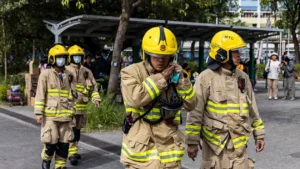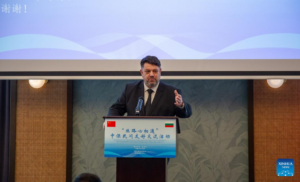Chinese city dims lights as record heatwave hits energy supplies
Show caption Lights have been dimmed on metro platforms, walkways and in malls, with commuters walking in partial darkness. Photograph: AFP/Getty Images China Chinese city dims lights as record heatwave hits energy supplies Highs of over 40C in Chengdu dry up hydropower reservoirs and raise demand for air conditioning Helen Davidson and agencies Fri 19 Aug 2022 10.43 BST Share on Facebook
Share on Twitter
Share via Email
A provincial capital in south-west China has dimmed outdoor advertisements, subway lighting and building signs to save energy as the area struggles with a power crunch triggered by record-high temperatures.
Temperatures rose past 40C (104F) in Sichuan province this week, fuelling massive demand for air conditioning and drying up reservoirs in a region reliant on dams for most of its electricity.
Factories including a joint venture with the Japanese car maker Toyota in the provincial capital, Chengdu, have been forced to halt work, while millions in another city, Dazho, grappled with rolling power cuts.
“Hot and muggy weather has caused the city’s electricity supply for production and daily life to be pushed to its limit,” Chengdu’s urban management authorities said in a notice on social media on Thursday.
Faced with a “most severe situation”, the city, which is home to more than 20 million people, had ordered landscape illumination and outdoor advertising lights to be switched off in notices issued Tuesday, the statement said. Building name signs will also be darkened.
Chengdu metro said in a video on China’s Weibo social media platform that it would also turn off advertisement lights and “optimise” the temperature in stations to save energy.
Photos circulating on Weibo showed dimmed lights on metro platforms, walkways and in malls, with commuters walking in partial darkness.
China has suffered a series of heatwaves and record-breaking temperatures this summer. By Friday, the national meteorological administration had issued red-level heat warnings for eight consecutive days, bringing the total to 30 days since June. The heat is expected to continue in some areas for the next 10 days.
On Thursday, the south-western city of Chongqing registered a record high of 45C, state media reported, hitting a record 11 consecutive days above 40C. As of Friday, Hangzhou had also experienced a record 30 days of high temperatures, the national meteorological administration said.
Multiple heat records have been broken and a worsening drought has reduced water levels in the country’s largest lake by 75%. On Thursday morning, the total area of Poyang lake in Jiangxi province had reduced by more than 2,200 sq km, to 737 sq km.
The drought is also drying up the critical Yangtze River, with water flow on its main trunk about 51% lower than the average over the last five years, state media outlet China News Service reported on Thursday.
Sichuan’s power woes could also have ripple effects on the wider Chinese economy – the province is a key supplier of energy generated by hydropower, including to eastern industrial powerhouses like Jiangsu and Zhejiang.
China is battling extreme weather on several fronts, with 17 people killed in a flash flood in the north-west of the country on Thursday after torrential rains.
Meanwhile, weather authorities in the eastern Jiangsu province warned drivers of tire puncture risks on Friday as the surface temperatures of some roads were expected to hit 68C.
The China Meteorological Administration earlier said the country was going through its longest period of sustained high temperatures since records began in 1961.
Scientists say extreme weather across the world has become more frequent due to the climate crisis and that urgent global cooperation is needed to slow an impending disaster. The world’s two largest emitters are the US and China.
But earlier this month Beijing announced it was freezing its cooperation with Washington on global heating in protest over a visit by the US House speaker, Nancy Pelosi, to Taiwan.
With Agence France-Presse












